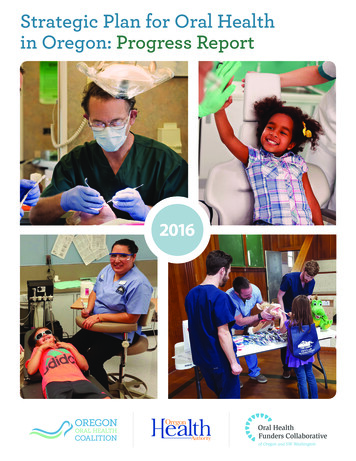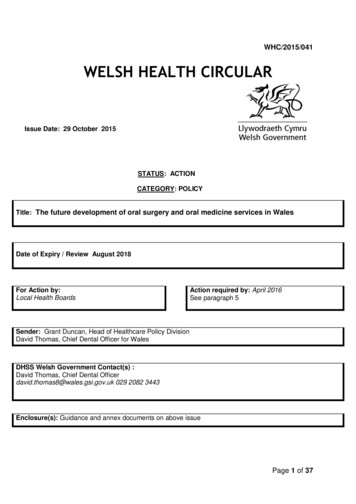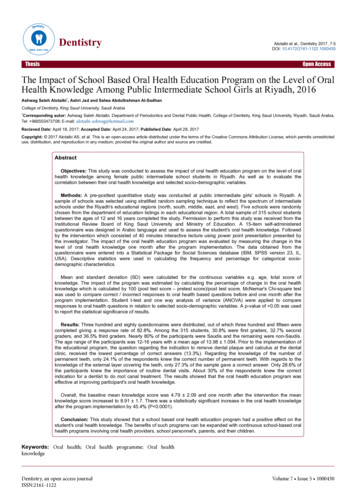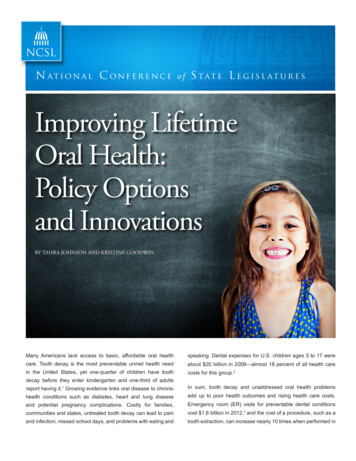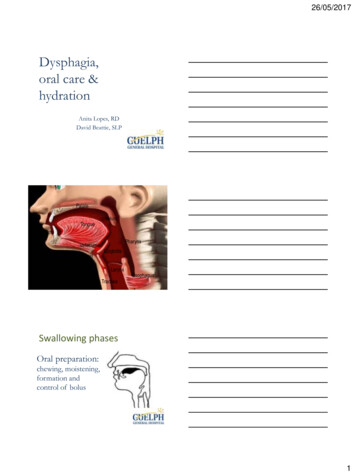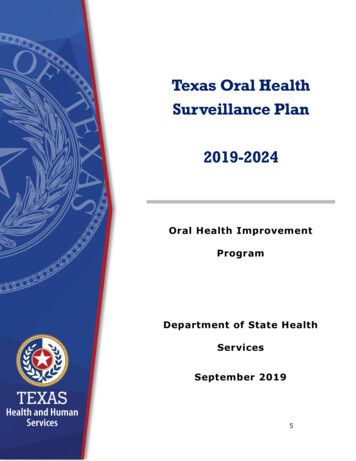
Transcription
The OralHealthCareAdvocateTexas Dental Association
1946 S IH35 Ste 400, Austin, TX 78704512-443-3675 tda.org
The OralHealthCareAdvocateTexas Dental Asssociation1946 S IH35 Ste 400, Austin, TX 78704512-443-3675 tda.orgIssue Briefs 2021
Contents:
111TeledentistryConnecting Patients to Dentists,Preserving Standards for Dental CareTexas Dental Schools313Dental InsuranceNetwork Leasing Transparency,Fairness in Claims Refund RequestsDental Practice ModelsPreserving Dentists’ Independent,Professional Judgment715Access to Oral Health CareFunding and Administrationfor Texas ProgramsScope of PracticePreventing Scope Expansionof Non-DentistsSchool Funding
TeledentistryConnecting Patients to Dentists,Preserving the Standard of Care
ISSUE 1:BACKGROUNDAdvancements in technology have changed how healthcare may be safely delivered to patients. This is especially evident during theCOVID-19 pandemic, in which dentistry is significantly disrupted by limiting the in-person interactions of dentists and patients.Teledentistry refers to the use of telehealth systems and communication methodologies within the practice of dentistry.Teledentistry allows dentists to communicate with patients remotely, extending the dental team’s reach, helping patients find andmaintain a dental home, and increasing access to dental care by reducing distance barriers.If teledentistry were available now, dentists could evaluate patients and triage dental treatment based on the patient’s needs,extending a dentist’s practice beyond the physical walls of a dental office and directly into communities throughout Texas. Thisbrings needed dental care to Texans in rural and underserved communities in which it may not be possible for patients to travel, orfor dentists to sustain a physical dental office.When accessing teledentistry services or procedures, it is critically important that patients receive the same standard or carethey would receive in an in-person setting. The legislature felt strongly about maintaining the standard of care and included therequirement in the state’s existing telemedicine and telehealth statute (Texas Occupations Code Chapter 111). Patients deserveequal teledentistry protections.TDA POSITION STATEMENTSThe Texas Dental Association supports teledentistry legislation that:1.Defines teledentistry in law.2.Ensures adequate supervision of dental team members and limits the number of dental team members that a dentist cansupervise remotely.3.Preserves the same standard of care for patients as they receive in person, by requiring an in-person examinationwithin 12 months for teledentistry services to continue.4.Ensures that patients participating in Medicaid and state-regulated insurance plans receive teledentistry dentalservices at the same levels as those provided through in-person encounters. Ensures that covered dental services,and payment for them, will not be limited or restricted based on using teledentistry technology.1
DentalInsuranceNetwork Leasing Transparency,Fairness in Claims Refund Requests
ISSUE 2:BACKGROUNDDentists report that one of the most challenging aspects of running a dental practice is complications with third-party payors/dentalinsurance. Patients and dentists deserve dental coverage that is clear to understand, removes financial and coverage uncertainties,and prevents insurance companies from making the coverage difficult for patients to use and dentists to navigate.Both the dentist and the patient have the same goal: to achieve and maintain optimal oral health. However, the ability to achievethis goal is compromised when insurers hinder or complicate the dentist-to-patient relationship.In a silent provider network, the policy issuer sells, leases, or rents its provider network to other insurance carriers or thirdparty payors of dental services. Participating dentists often have no knowledge of the sale, lease, or rental. When this is donewithout complete transparency, patient-dentist trust erodes, which can lead to incorrect assumptions about treatment plans andunforeseen costs.Dental insurers audit their claims payments after the payments are made to dentists to ensure accuracy and efficiency. However,dentists and patients expect insures to process dental claims accurately and within a reasonable amount of time. This processbreaks down when a carrier demands reimbursement of a paid claim after a significant amount of time has passed since the dentistprovided dental services to the patient. These unexpected charges are distressing for dentists and especially for patients who mayface significant hardships accepting financial responsibility for dental care they thought was already paid by their insurance.The Texas Dental Association supports legislation to:1.2.Require state-regulated dental insurers to follow fair and accurate network leasing laws that create transparency fordentists and patients and give dentists an opportunity to review contracts prior to participating in a leased, sold, or rentednetwork.Require state-regulated dental insurers to follow insurance laws that create reasonable procedures and timeframes forinsurance companies to engage in payment recovery efforts.TDA POSITION STATEMENTSSilent Insurance Networks (Network Leasing)–Transparency and Disclosure to Dentists Insurance carriers must properly notify dentists when the insurance plan they join is sold, leased, or rented to adifferent payor. Dentists must have an opportunity to review the network sale or lease agreement, enabling the dentist to proactivelydecide whether to participate.3
Dental Insurance - ContinuedRetroactive Denials–Fairness in Claim Payment Refund Requests Insurers can make mistakes adjudicating claims, and it is reasonable to allow them to collect validoverpayment errors, if within a reasonable time period. State-regulated insurers should be prohibited from recovering an overpayment made to a dentist unlessthe carrier notifies the dentist in writing no later than 90 days after the dentist received the overpayment. The dentist should have 45 days after receiving the written overpayment notice to agree or challenge theoverpayment request. If the dentist disagrees with the recovery of funds request, the applicable plan or policy must provide thedentist with an opportunity to challenge or appeal the overpayment recovery request.
Access to OralHealth CareFunding and Administrationfor Texas Dental Programs
ISSUE 3:BACKGROUNDThe Texas Dental Association aims to reduce the number of adults and children with untreated dental disease through oral healtheducation and prevention, and by providing timely treatment to patients in need of care. The goal is to make Texans healthierthrough access to a dentist.The state must adequately fund dental programs and public health initiatives that provide dental services and oral health awarenessand education to Texans in need.TDA POSITION STATEMENTSMedicaid and Children’s Health Insurance Program Funding (CHIP) and Administration Texas has not increased reimbursement rates for Medicaid-participating dentists since 2007. Maintaining adequate reimbursement rates for dental care is paramount to ensuring patients can access dentists to receivenecessary dental services and directly impacts the more than 3 million Texas children receiving dental care in Medicaid and CHIP. Texas also needs to continue efforts to reduce the administrative burdens placed on dentists participating in Medicaidmanaged care and improve efficiency in claims administration and dentist reimbursement.Dental Education Loan Repayment Program–Funding The Dental Education Loan Repayment Program (DELRP), previously administered by the Texas Higher EducationCoordinating Board (THECB), provided student loan repayment assistance to dentists in return for their practice inunderserved areas throughout the state. Although this program is authorized in statute under Texas Education Code Chapter 61 Subchapter V, the legislaturehas not appropriated funds for the program since the 2016-2017 biennium. For this reason, the THECB repealed theprogram rules in 2019. History proves the program worked and increased access to care by incentivizing dentists to practice in underservedparts of Texas. TDA strongly supports the DELRP and asks the legislature to reinstate adequate funding to this valuable program toconnect dentists to patients in need.7
Access to Oral Health Care - ContinuedTexas Fluoridation Program Funding The current state budget (Senate Bill 1 and House Bill 1) includes a funding reduction to the TexasFluoridation Program (TFP) at the Texas Department of State Health Services (DSHS). TFP helps public water systems with engineering design, installation, and maintenance of communitywater fluoridation systems. The proposed budget reduction eliminates the state’s fluoridation engineer position. TDA strongly supports the practice of community water fluoridation as a safe and effective strategy toimprove Texans’ oral health. TDA asks the legislature to restore funding to the TFP and retain the fluoridation engineer position sothat the TFP can continue the technical assistance it provides to Texas communities in maintaining andexpanding community water fluoridation.State Dental Director There is no statutory requirement that the dental director for the Oral Health Improvement Program(OHIP) at DSHS be a Texas-licensed dentist. Mandating in law that the program be led by a dentist ensures that it is directed by a person with themost appropriate level of education and training that the position demands.Oral Health Improvement Program Funding Failure to treat dental disease has serious economic and medical consequences. The OHIP at the DSHSencourages Texans to improve and maintain good oral health. The OHIP works with various partners across the state to identify the oral health needs of Texans andthe resources to meet those needs. Adequate funding helps ensure that the OHIP has the resources necessary to collect, analyze, anddisseminate essential oral health data, develop and implement comprehensive oral health educationcampaigns, and possibly expand the direct delivery of dental services for uninsured children, pregnantwomen, and other at-risk populations.
TexasDental SchoolsSchool Funding
ISSUE 4:BACKGROUNDThe Texas Dental Association supports the mission of state-funded, university-based dental schools, which is to educate students toserve their patients and communities and continue to grow in skill and knowledge over their lifetime in practice. With the creationof any new dental school, the historical legislative support, including financial support, should be maintained for the existing dentalschools in Texas.Texas dental schools incorporate clinical, real-life experiences for students as part of their education curriculum. Students, underthe supervision of dentists, provide needed dental care to underserved and special needs adults and children.TDA POSITION STATEMENTS Texas dental schools provide critically needed oral health care to underserved populations. Texas dental schools train a diverse group of future clinicians for important roles in Texas’ oral health workforce, improvingthe oral health of individuals and communities throughout the state. The state provides much of the funding to the dental schools. State dollars to the schools must be protected to ensure that theschools can continue operating their dental clinics and educating and training the state’s dental workforce.11
DentalPractice ModelsPreserving Dentists’ Independent,Professional Judgment
ISSUE 5:BACKGROUNDThe Texas Dental Association embraces innovation and diversity among dental practice models in Texas. While each model mustcomply with Texas laws and regulations, a broad spectrum of practice models–big and small, general and specialty–is needed toserve patients and the dentists who treat them.Previous legislative priority items for the TDA included efforts to strengthen regulations designed to enhance patient safety, patientprotection, and proper care involving dental support organizations (DSOs) and other types of large, multiple-location practices.Texas law is clear: only licensed dentists may own dental practices in Texas, and non-dentists may not interfere with patient/clinicalcare. Non-dentists who illegally own dental practices and/or interfere with patient/clinical care should be held accountable for theiractions.DSOs and large group practices are one of many segments in the Texas market that help to provide access to care for a growingpopulation. However, the practice of dentistry is the responsibility of the individual dentist, and improper influence or interferenceby a non-dentist jeopardizes patient safety and ethics.TDA will continue to work with lawmakers and regulators to determine if additional actions are needed to address emergingaccountability, safety, and ethics issues.TDA POSITION STATEMENTS Texas must ensure that citizens have access to high-quality dental care delivered by licensed, professional dentists. Only dentists have the training and experience required to make appropriate clinical dental treatment decisions. The following principles, which are codified in statute–coupled with strong, effective laws and regulations of dentists anddentistry–protect Texas dental patients:1.2.3. Dental practices in Texas must be owned by dentists.Dentists are the head of the dental team.Dentists must make all decisions regarding clinical care without improper influence from non-dentists, asdentists are ultimately and appropriately held accountable for the care rendered.Non-dentists who influence clinical care should be held accountable for their illegal actions, as they undermine thesafety of patients and sanctity of the doctor-patient relationship.13
Scopeof PracticeProtecting Texas DentalPatients
ISSUE 6:BACKGROUNDThe Texas Dental Association is committed to working with state and community leaders to identify and advance solutions thatmeaningfully address barriers to oral health care for Texans.Helping all Texans attain the optimal oral health they deserve is a core commitment of the TDA.Every Texan deserves comprehensive care provided by a dentist. TDA opposes legislative efforts–such as the dental hygienepractitioner or other proposals–which authorize dental hygienists to perform many comprehensive, complex procedures currentlylimited to doctors of dental surgery (DDS) and medicine (DMD).Additionally, TDA opposes efforts which lower the Texas standard of dental care, such as permitting dental hygienists to injectpatients with local anesthetic. There is no compelling reason to do so.TDA POSITION STATEMENTSDental Hygiene Practitioner TDA opposes efforts such as the dental hygiene practitioner or other proposals that remove the dentist from the patient andcreate a 2-tiered system of care. Dentists, as the head of the dental team, are properly educated and trained to provide comprehensive care to patients. Every Texan–regardless of where they live or their socio-economic status–deserves to be treated by a dentist. The dentist workforce in Texas continues to grow. Issues with distribution of dentists may be solved with programs such as: The dental education loan repayment program, which incentivizes dentists to practice in rural andunderserved areas; and Funding to the state Oral Health Improvement Program, which ensures needy Texans have access todental care. Focus should be placed on these solutions, not on lowering the Texas standard of dental care.Local Anesthetic by Dental Hygienists There is no shortage of qualified individuals to inject Texas dental patients with anesthetics. Topical anesthetics–which dental hygienists already have the authority to administer–are readily available and highlyeffective for pain relief associated with many dental procedures.15
The Oral Health Care Advocate Texas Dental Asssociation 1946 S IH35 Ste 400, Austin, TX 78704 512-443-3675 tda.org Issue Briefs 2021


